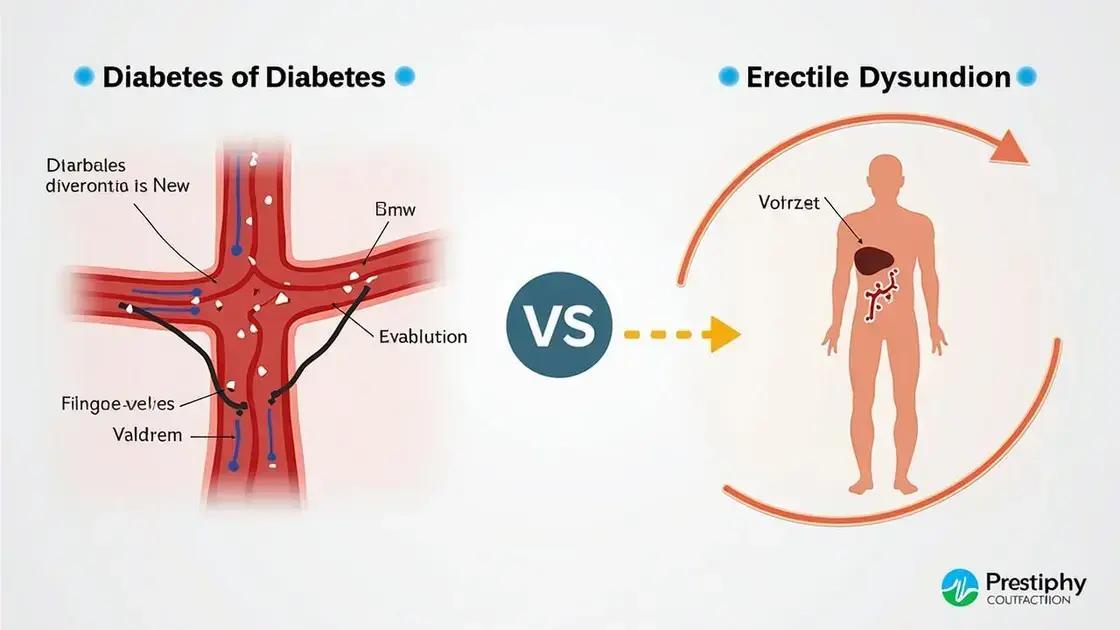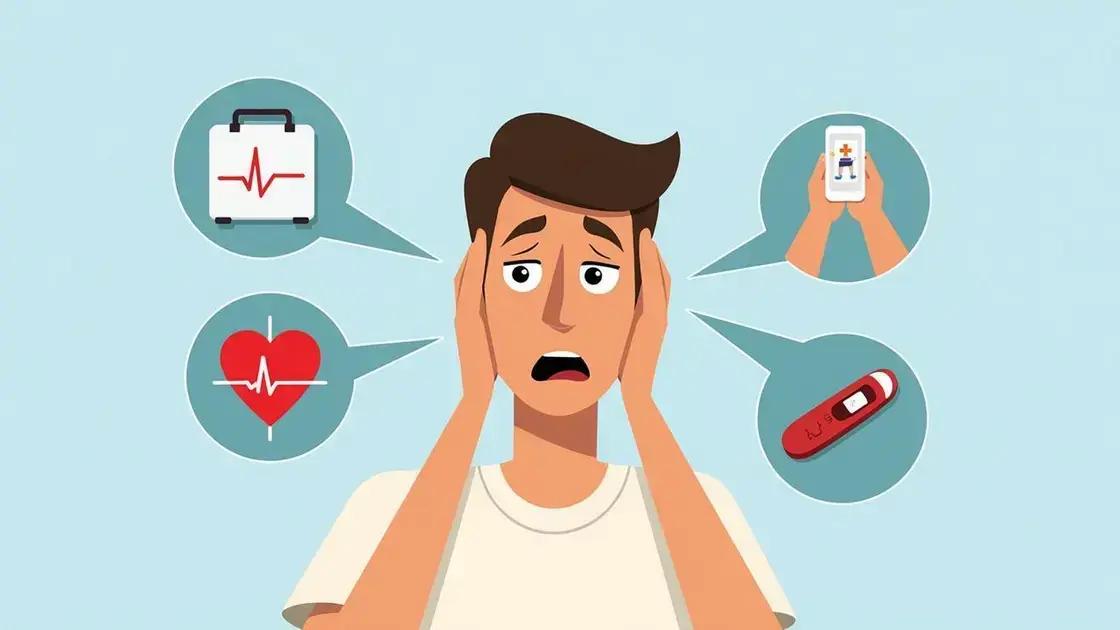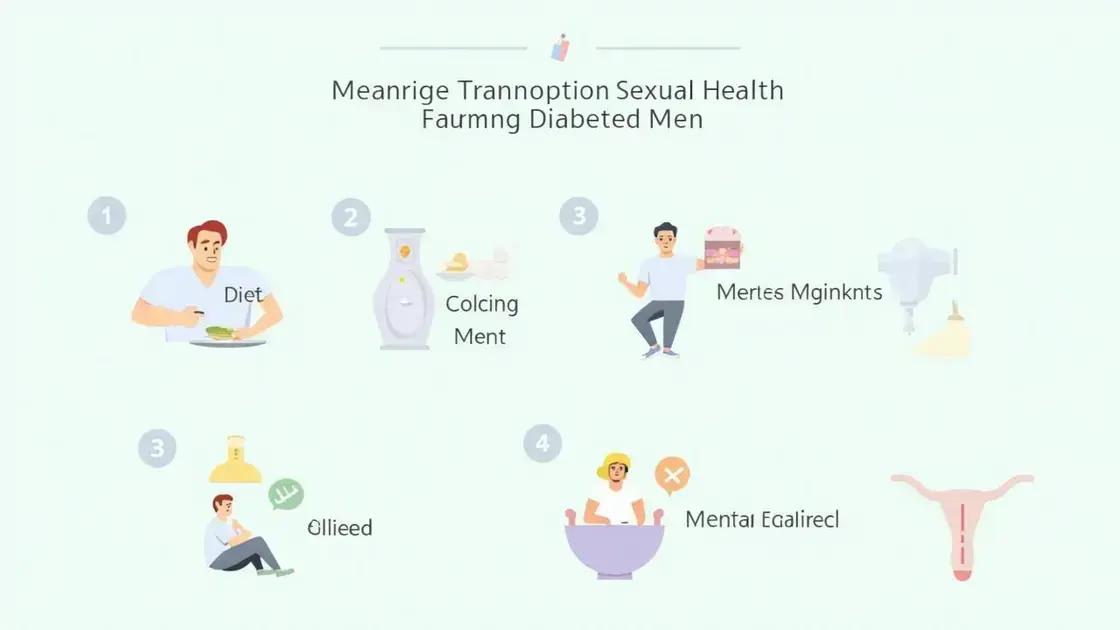Erectile dysfunction can worsen with untreated diabetes, largely due to damage to blood vessels and nerves. Treatment options include oral medications, injections, and lifestyle changes, while preventive measures like maintaining healthy blood sugar levels and regular exercise can significantly improve sexual health.
Diabetes significantly impacts various aspects of health, and one area that often gets overlooked is sexual function. Many wonder: does erectile dysfunction worsen with untreated diabetes? This article delves into the link between these two conditions, highlighting the importance of early intervention and treatment. Understanding how diabetes affects blood flow and nerve function is essential for maintaining sexual health. Join us as we explore signs of erectile dysfunction in men with diabetes, various treatment options, and preventive measures to lead a healthier life.
Understanding Erectile Dysfunction and Diabetes

Understanding Erectile Dysfunction (ED) is key for many men, especially those with diabetes. ED is the inability to achieve or maintain an erection for sexual intercourse. This condition can greatly affect self-esteem and relationships.
Diabetes and Its Impact on the body can lead to several complications. When high blood sugar levels persist, they can damage blood vessels and nerves throughout the body. This damage is particularly concerning for men, as it can hinder the signals necessary for an erection.
How Diabetes Affects Sexual Health
Men with diabetes often experience a range of sexual health issues. Reduced blood flow and nerve damage can lead to a decrease in sexual desire and function. Studies show that men with diabetes are twice as likely to suffer from ED compared to those without the condition.
Common Concerns
Aside from diabetes, other factors can contribute to ED. These include high cholesterol, hypertension, anxiety, and certain medications. It is vital for men to talk about these issues with their healthcare provider, as early recognition can lead to better management.
Importance of Awareness
Being informed about the risks associated with untreated diabetes is crucial. Failure to manage blood sugar levels not only worsens diabetes but can also exacerbate erectile dysfunction. This connection highlights the importance of regular check-ups and a healthy lifestyle.
How Diabetes Affects Blood Flow

Diabetes affects blood flow in several ways. High blood sugar levels can harm blood vessels, making them less flexible and narrowing them. This damage reduces the amount of blood that reaches various parts of the body, including the penis.
The Role of Blood Flow in Erection
For an erection to occur, increased blood flow to the penis is essential. When a man becomes aroused, the brain sends signals to the blood vessels, which then relax and fill with blood. In men with diabetes, impaired blood vessels can lead to insufficient blood flow, resulting in erectile dysfunction (ED).
Nerve Damage from Diabetes
In addition to affecting blood vessels, diabetes can damage nerves, a condition known as diabetic neuropathy. When the nerves that signal erections are affected, the brain’s ability to communicate with the body is impaired, further complicating the situation.
Other Contributing Factors
Other health conditions related to diabetes can also affect blood flow. Issues like high cholesterol, high blood pressure, and obesity can raise the risk of cardiovascular diseases. These conditions can further narrow blood vessels and limit blood circulation.
The Importance of Managing Blood Sugar
Maintaining proper blood sugar levels is crucial for preventing or minimizing these complications. Regular monitoring of blood glucose, a balanced diet, exercise, and medications can help manage diabetes and, in turn, improve blood flow and sexual health.
Signs of Erectile Dysfunction in Diabetic Patients

Signs of erectile dysfunction (ED) can manifest differently in diabetic patients compared to those without diabetes. Recognizing these signs is essential for prompt treatment.
Difficulty Achieving an Erection
One of the most common signs of ED is the difficulty in getting or maintaining an erection during sexual activity. If this happens frequently, it may be a sign that blood flow or nerve signals are impaired.
Reduced Sexual Desire
Diabetic men may also experience a reduced interest in sexual activity. Factors such as nerve damage, fatigue from managing diabetes, and hormonal changes can contribute to this decline in libido.
Pain During Intercourse
Some men may face discomfort or pain during intercourse, which may stem from complications related to diabetes, such as infections or psychological factors linked to anxiety and stress about sexual performance.
Psychological Symptoms
ED can lead to feelings of shame, embarrassment, or anxiety. Diabetic patients may feel particularly stressed about their condition, increasing the emotional burden associated with sexual function.
Physical Changes
It’s important to note that diabetes can lead to other health issues that contribute to ED, such as obesity and cardiovascular problems. These conditions can exacerbate the signs and severity of erectile dysfunction.
Treatment Options for Diabetic Erectile Dysfunction

Treatment options for diabetic erectile dysfunction vary depending on the severity of the condition and the individual’s overall health. It is essential to work closely with a healthcare provider to determine the best course of action.
Oral Medications
Oral medications, known as phosphodiesterase type 5 (PDE5) inhibitors, are commonly prescribed for ED. These include Sildenafil (Viagra), Tadalafil (Cialis), and Vardenafil (Levitra). They improve blood flow to the penis and can help achieve an erection when sexually stimulated.
Injections
If oral medications are not effective, injections may be an option. Medications like Alprostadil can be injected directly into the penis. This method has a higher success rate but may cause discomfort or bruising at the injection site.
Vacuum Erection Devices
A vacuum erection device (VED) is another treatment option. This device creates a vacuum around the penis, increasing blood flow and causing an erection. Once an erection is achieved, a ring is placed at the base of the penis to maintain it during intercourse.
Psychological Counseling
Since diabetes can cause emotional stress and anxiety, psychological counseling can also be beneficial. Speaking with a therapist may help address underlying concerns and improve sexual confidence.
Adjusting Diabetes Management
Improving blood sugar control is critical in treating diabetic erectile dysfunction. By managing diabetes more effectively through diet, exercise, and medication, many men can see improvements in their sexual function.
Preventive Measures to Improve Sexual Health

Preventive measures to improve sexual health are vital for men with diabetes. By taking steps to maintain overall health, individuals can reduce the risk of erectile dysfunction (ED) and enhance their sexual life.
Maintain Healthy Blood Sugar Levels
Controlling blood sugar levels is the most important preventive measure. Men should monitor their glucose levels regularly and work with their healthcare provider to ensure optimal management through diet, exercise, and medications.
Regular Physical Activity
Engaging in regular exercise can improve blood circulation, decrease body fat, and enhance mental well-being. Aim for at least 150 minutes of moderate-intensity exercise each week, including aerobics and strength training.
Healthy Diet
Eating a balanced diet rich in whole grains, fruits, vegetables, lean proteins, and healthy fats can support overall health. Foods high in antioxidants, such as berries and leafy greens, may further protect vascular health.
Avoid Smoking and Limit Alcohol
Smoking can constrict blood vessels and impede blood flow, aggravating ED. Limiting alcohol intake is also crucial, as excessive drinking can lead to sexual dysfunction.
Manage Stress and Mental Health
Managing stress through relaxation techniques, such as yoga or meditation, can help improve sexual health. If anxiety or depression is an issue, considering counseling or therapy can be beneficial.
In Summary: Managing Erectile Dysfunction with Diabetes
Erectile dysfunction (ED) is a common concern for many men with untreated diabetes, but understanding its connection to the condition can empower individuals to seek help. By recognizing the signs of ED early, men can take proactive steps to manage their health.
Effective treatment options, such as oral medications, injections, and lifestyle changes, can greatly improve sexual health. Moreover, preventive measures like maintaining healthy blood sugar levels, engaging in regular physical activity, and managing stress play a crucial role in reducing risks associated with ED.
Ultimately, open communication with healthcare providers and a commitment to a healthier lifestyle can lead to better outcomes. With the right approach, men with diabetes can reclaim their sexual health and enhance their quality of life.
FAQ – Common Questions About Erectile Dysfunction and Diabetes
How does diabetes contribute to erectile dysfunction?
Diabetes can damage blood vessels and nerves, impairing blood flow and the ability to achieve or maintain an erection.
What are the signs of erectile dysfunction in diabetic patients?
Signs include difficulty achieving an erection, reduced sexual desire, and pain during intercourse. Emotional factors may also contribute.
What treatment options are available for diabetic erectile dysfunction?
Treatment options include oral medications, injections, vacuum erection devices, psychological counseling, and better management of diabetes.
What preventive measures can improve sexual health for diabetic men?
Preventive measures include maintaining healthy blood sugar levels, exercising regularly, eating a balanced diet, avoiding smoking, and managing stress.
How important is communication with healthcare providers regarding erectile dysfunction?
Open communication is essential for identifying problems early, discussing treatment options, and ensuring effective management of both diabetes and ED.
Can lifestyle changes really improve erectile dysfunction in diabetic patients?
Yes, lifestyle changes such as diet modification, exercise, and stress management can significantly improve erectile function and overall health.












